2024-04-02
King of the Mods
Happy Easter, comrades! Here’s an egg for you.
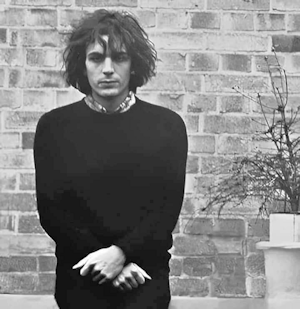
April
The year is in its fourth month, and I have only posted one entry so far. I could blame this on a lack of Syd, which is partially true, but my ongoing flair for procrastination is probably closer to the truth. There’s an article in the pipeline, a review of the Have You Got It Yet? documentary, but this will be published when it is finally released on DVD, Blu-Ray, or whatever new technology they will have invented to grab the money out of our pockets. If you haven’t read my previous post on that documentary, and it is, without bragging, one of those extraordinary world-exclusive Church ones, you can find that here: Incarceration of a Flower Child.
Plenty of new Syd fans are popping out this year, like mushrooms on a field. They often comment on the Holy Church's Tumblr or Facebook pages, which are invariably infested with pictures of the bard and his band. “Great photo,” they sometimes say, “I’ve never seen that one before.” I mainly sigh and think of two decades ago, when the old gang of Clowns & Jugglers discussed these pictures ad infinitum.
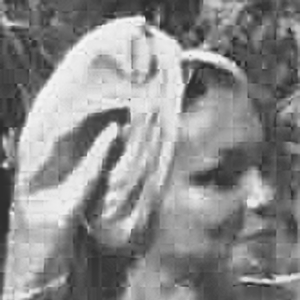
Brighton
The previous Church post premiered an unknown Iggy picture that was found by Emo Moore, but that news was largely ignored by the masses. Long gone are the days when the Holy Church of Iggy the Inuit was a force to be reckoned with. So it goes.
Anyway, in that article, we quoted a line from Iggy:
Denzil was THE Ultimate Cool. He was an unrivalled leader. The sharpest dresser in hand-made Italian silk suits and the finest Italian shoes. Denzil epitomised style and elegance. He was the dandiest of the dandies.
We tried finding out who this Denzil bloke was. Our theory was that he might have been an English Boy. English Boy was a (mostly) male modelling agency, started by the hippy aristocrat Mark Palmer. But we couldn’t find Denzil in the scarce lists that are roaming the Internet here and there.
Emo
Emo Moore, who is a Sixties and Floydian archivist, whether he likes it or not, came to the rescue and published a picture of Denzil. Denzil was a Mod. Thanks to the wonder of reverse image search, we could find a bit more about him.

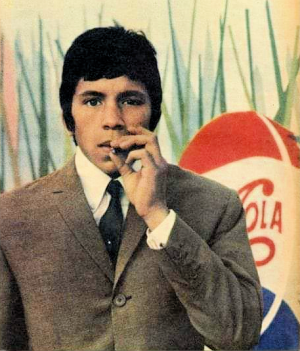
Sunday Times Magazine
Denzil was interviewed for the Sunday Times Magazine in the summer of 1964. The article, titled ‘Changing Faces’, was written by Kathleen Halton with pictures by Robert Freeman.
Robert Freeman (1936–2019) is of course well-known for his Beatles photography, but he also directed the 1968 movie The Touchables, a sex comedy with a ‘plot thinner than a paper towel’, to quote Simon Matthews. The only reason we mention this is because one of the scenes of this silly film contains a sample of Interstellar Overdrive, from our favourite Cambridge boys band. (See also: Psychedelic Celluloid.)
Back to the Sunday Times article. It interviews a couple of Mods and if you want to read the full article, you can go to Anglo Zine, who preserved a copy.
We will only highlight Denzil’s parts, which are pretty nihilistic for a boy of 18. Take the following quote:
You go down to the sea because you get bored. The summer comes around, you keep saying you’re going to do something different – go to Jersey and do a season. You keep saying you’re going to do something about it. Then all of a sudden it’s September again.
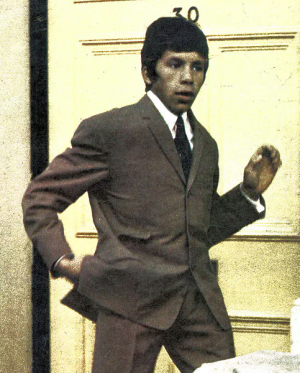
Twenty-something
That’s deep, but it is mainly because Denzil thinks that life will be virtually over in a couple of years. Too old to rock 'n' roll, too young to die.
Once you’ve got to 20 you consider yourself a bit old-mannish. If you’re a bit juvenile you can get away with it. But you know yourself you’re getting on, you’re going to be left out of things.
Denzil lived in Streatham, where his father was a garage mechanic. Things used to be lively in Streatham, but then:
...kids started going up to the West End and getting introduced to the pills, getting edgy and argumentative. There’s a lot of lying when you get ‘blocked’ - the number of girls you get in a week, the price of your suit. But the drug kick is dying out a bit.
Sexual Revolution
In the same article, Eric Burdon of The Animals complains that 'most of the real beaty type girls are sexually dumb’. Denzil, in his infinite wisdom, partially agrees:
The fellow’s got to like a girl a lot to have her around with his friends. Of course you get the all-night parties. Jumping around to a gramophone. Then all of a sudden you get tired and go to sleep.
Mods, as most of us will know, take care of their looks and their clothes.
American styles are out, like Madras cotton jackets, and Seven and Sixes – that’s the name we give to baby Mods who’re still wearing these 7s and 6d. T-shirts from Woolworths.
Denzil further explains that it’s suits now and basket shoes. A Mod needs approximately £15 a week to be a leader. Most Mods only make between £8 and £10 a week and spend about £4 on clothes.
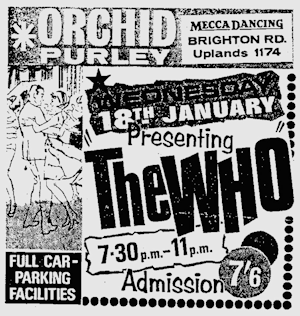
The Orchid
So where’s the link between Denzil and Iggy, I hear you say? Well, there was a temple for Mods, where Rockers wouldn’t stand a chance. It brings us back to the early days of the Holy Church of Iggy the Inuit when we discussed the dance hall Iggy used to frequent before Jeff Dexter dragged her into the catacombs of the London Underground.
The author of ‘Changing Faces’ is Kathleen Halton (1937–1995). Kathleen Jeannette Halton Tynan was a Canadian-British journalist, author, and screenwriter. But she wasn’t a member of the in-crowd when she wrote her article. Throughout the text, she keeps on calling the Orchid Ballroom the Orchard Ballroom.
The Orchid at Purley, according to Halton, had two bars and ultraviolet lights that played on the dancers. Getting in cost you 3s if you could get past the bouncers. Denzil explains that Mods didn’t call themselves Mods.
You wouldn’t be pleased to call yourself that. Though you might call us stylists or faces. (…) If you can’t dance you might as well go home. Or you have to dress really smart to make up for it.
Denzil did both. He was a 'face' allright, and a 'leader'.
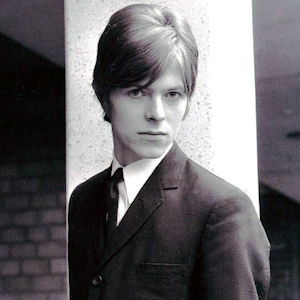
Agenda
Mods had a filled agenda. Monday was Mecca night at the Hammersmith or the Orchid.
Tuesday was the best night at The Scene. The Scene was the leading mod club in the centre of London. As London Live recalls, riding into Ham Yard on a scooter was the preferred mode of arrival.
Wednesday to Friday were nothing special, although Mods had to find the time to wash their hair.
Saturday was West End night. Being a Mod was a full-time job.
Movies, or football? We don’t have time for them because Sunday’s meant for the Flamingo, or sleeping, and Saturday for shopping.
Mocksters
Mods were more worried about having a good time than having a good job. Some were just pretenders, nicknamed Mocksters. Denzil:
Everybody wants to go abroad. Some get ‘blocked’ and say they’ve just been washed up in Switzerland or Casablanca. But you know it’s not true.
‘Changing Faces’ may be a nice period piece and (perhaps) the only place where Denzil was given a place to ventilate, but it doesn’t reveal a lot about him.
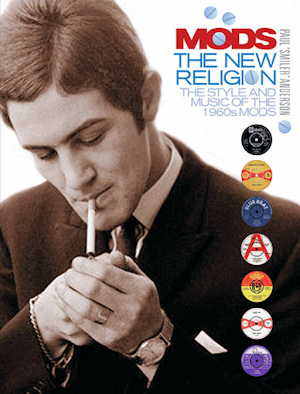
A New Religion
In 2013, Paul ‘Smiler’ Anderson wrote what is believed to be the ultimate Mods anthology: Mods: The New Religion. It is a 300+ page history of the movement, packed with facts, anecdotes, and oral history.
Pat Farrell remembers Denzil and even reveals his last name, Denzil Souman.
People like Pete Sinacol, Denzil Souman, Geoff Morris and Dilly (Keith Dyett) stood out as faces. Geoff Morris was a fantastic dancer and people would just stand and watch him. (...)
One night we were all on the the tube going to Piccadilly Circus. The tube was jam-packed – it was about 10 o'clock at night. All of a sudden, I'm sure it was Denzil, put his head out of the window and shouted, 'All aboard the night train!‘ and the whole train started singing and dancing James Brown style.
Denzil used to hang around Tooting and Streatham. He was good friends with Geoff Morris. Denzil was unusual because he was South American, and there weren't that many dark-skinned people on the scene. He always looked absolutely amazing, completely different. He always stood out from the crowd and whatever he did, you'd notice. I thought it was great he made it onto the front cover of The Sunday Times Magazine. I thought it was good because it was the first article to show what really happened. I was very proud of Denzil and anybody else who became quite well known because I thought they deserved it.
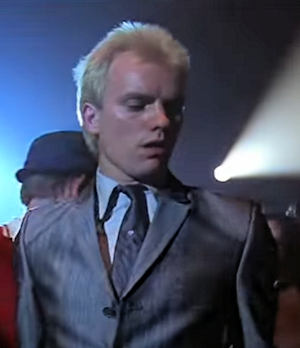
Quadrophonic Dance Moves
Quadrophenia is a 1979 British drama film, based on The Who's 1973 rock opera of the same name. As Jeff Dexter had been a DJ at The Orchid and The ‘Mingo (Flamingo), he was asked to consult on some of the dance scenes.
I did three days with the initial cast and then had to get everyone in the ballroom and try to show them all various dances. Sting couldn't dance to save his fuckin' life, but in fact the dance he does is what I taught him. Because he couldn‘t move like some of the others I gave him a strange dance which was based on a well-known Mod from South London. Everybody talks about Denzil being one of the sharpest-dressed Mods but he used to dance differently from everybody else.
I remembered that is how he danced at the Orchid Ballroom in Purley. He sort of danced with his arms up so he didn't crease his suit. (…) So that strange dance was actually based on Denzil’s moves. A few people said terrible things about the way I gave Sting his dance steps at the time the film came out, but they were people who weren't originally there. So in one sense it’s totally authentic.
But what happened between Denzil and Iggy? Did they ever share the dance floor? We’ll probably never know, unless the future has something in store for us.
The Church wishes to thank: Iain Emo Moore, Iggy Rose.
♥ Libby ♥ Iggy
♥
Sources (other than the above-mentioned URLs):
Anderson, Paul: Mods.
The New Religion, Omnibus Press, London, 2014, p. 138, 171, 302.
Bacon,
Tony: London Live, Balafon Books, London, 1999, p. 71.
Halton,
Kathleen: Changing Faces, The Sunday Times Magazine, London,
August 2, 1964, p. 1, 12, 14-15, 17-18.
Matthews, Simon: Psychedelic
Celluloid, Oldcastle Books, Harpenden, 2016, p. 81.

